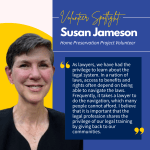Volunteer Profile: Dayana Morales

1. Can you tell me a little about yourself?
I was born and raised in Ecuador. On New Year's Eve of 2020, I moved to the United States to pursue a master’s degree at the University of Maryland Baltimore County.
2. Which of PBRC’s projects do you volunteer with, and how did you get involved?
After finishing my studies, I submitted my paperwork to change my status from student to resident. Over time, I discovered that my gift is serving others and while waiting for approval —which took a year and three months— a friend from my Bible study group, who was also a student at the University of Baltimore School of Law, told me about PBRC and mentioned that Spanish speakers were needed (she learned this through an email from her university). My friends knew I was looking for ways to volunteer and contribute to society. When I heard about this opportunity, I knew that my bilingual skills would be useful, allowing me to do what I love, which is to serve others well. Next, I reached out, received training, and began volunteering as an Interpreter with the Maryland Immigrant Legal Assistance Project in January 2024. I plan to remain involved for as long as I can.
3. What do you find interesting about this work?
As an immigrant myself, I found it very difficult to adapt to the culture, weather, food, and even language. When I moved here, I knew English, but I didn’t realize how challenging it would be to constantly speak English without resting to speak my own language. Everywhere I went felt very different from my country, and when I encountered another Hispanic person, I felt a surge of excitement because it gave me a brief opportunity to rest my mind and speak Spanish.
What I want to convey is that I understand how the people who come to the clinic also experience that sense of relief when they find someone who speaks their language. I know they feel more comfortable meeting with the attorneys, knowing their story will be delivered accurately. If I can make their day a little bit easier, I will continue to do so.
4. What, if anything, did you find surprising about volunteering at community clinics or in-court? What has been rewarding? What, if anything, has been frustrating?
I actually know very little about law and immigration processes, as my core area of study is business. However, Cate has been very kind in answering my questions after meetings with clients. In turn, learning about the various steps and challenges people face to live here legally has been surprising, as it can often be a long and difficult journey. However, knowing that, somehow, we can help make their experience a little easier has been very rewarding, in my case, whether through filling out forms or interpreting in person or online.
5. Tell me about a client you have met while working with PBRC, or a pivotal experience you’ve had volunteering with the projects.
One day, I was waiting outside one of the courtrooms to inform people about the clinic when I saw someone at the window trying to deliver their documents. He was struggling to explain what the documents were about, so I approached him and offered to help. I quickly read the form and realized it was for a change of address, but it was filled out incorrectly. I explained the clinic's services to him, and he decided to come with me to meet Cate.
It turned out he not only needed a change of address but also a change of venue. Cate and I assisted him with both, and now he won’t miss any notifications or communications, nor will he have to travel as far as New York, where his original venue was located. This being said, I’m so happy I was there at the right time to help him.
6. Is there a particular moment or memory that stands out for you?
It was Wednesday around 9:00 a.m. at the Baltimore Clinic when I heard something happening outside the room. As I remember it, Cate went to see what was happening and later came in with a person who thought he had a hearing in Baltimore, but it turned out his hearing was in Texas. Cate quickly asked me to find the virtual room for the judge he was assigned to, while she tried to connect through her computer against weak internet connection. As a result, I quickly searched for the information on my phone.
Once we found the details, we connected the client through his phone just minutes before the hearing ended. The judge was explaining that he should have appeared in person. I was trying to assist when the judge asked if anyone else was with him. Cate jumped on the call, introduced herself, and explained the situation. The judge then informed her that the client needed to come to the next hearing with his asylum application filled out in English and that he should attend in person.
At the end of the call, Cate explained everything to the client, and we felt very relieved, as he was able to connect in time to hear the judge’s instructions. The adrenaline I felt that day while trying to assist him is something I will never forget. That day I learned of a special option where some judges have virtual rooms for people who cannot attend in person.
7. How has doing pro bono work changed you?
I have been doing pro bono work since I was in Ecuador, in different ways for different causes, and it is something that fills my heart. Aside from my daily activities, it continues to give me a strong sense of purpose. Ultimately, doing pro bono work is very rewarding and fulfilling.
For more information about volunteering in Maryland, please contact: education@probonomd.org







